(♦) Any Dubaian met by a run-of-the-mill tourist is likely to speak passable English. I started conversations in my native tongue, never felt presumptuous for doing so.
If you aren’t run-of-the-mill and like to do odd things, you might wander far enough afield to meet locals who can’t savor great American artistes like Moe and Larry and Curly without subtitles. That happened to me when I tried to ride the F30 bus from the metro to the Miracle Garden. Most would have taken a cab. The F30 was full of Indian construction workers. The bus driver managed to tell me where to get off, but just barely and not easily. Your follicly challenged world wanderer just might have been stranded in the desert for awhile.
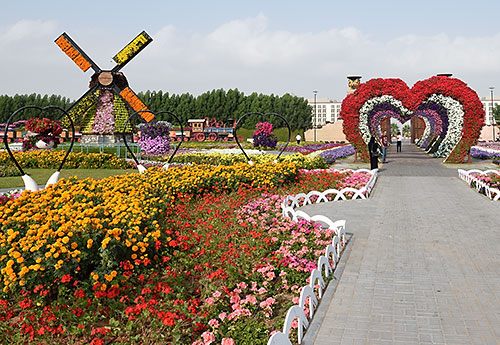
(♦) If you’re a holder-of-grudges and still haven’t forgiven that rotten casanova who made off with your ex, consider comping him to a gala August vacation in a Dubai hotel without air conditioning. The needle can hit 115 degrees Fahrenheit in Dubai in August, linger at a zesty 95 at midnight. He’ll wish he’d never seen her.
Dubai is not a summer destination. I suspect that the big tourist draws are the winter heat and sun, particularly for seasonally affected Europeans. I could have walked around in my shirt sleeves when I visited in January.
(♦) Dubai is many miles of practically-brand-spanking-new glitter and polish around old town acres on Dubai Creek. In the old town, you can stroll among spice and gold souks beneath boxy wind towers, among locals in robes and skullcaps, and feel you’ve arrived in the Middle East.
In ‘new’ Dubai you’ll see robes, gowns and skullcaps, too, but perhaps while sipping a frappe at the Dubai Mall. European tourists stroll comfortably among Emirati in these modern blocks, but don’t seem to mingle with them much.
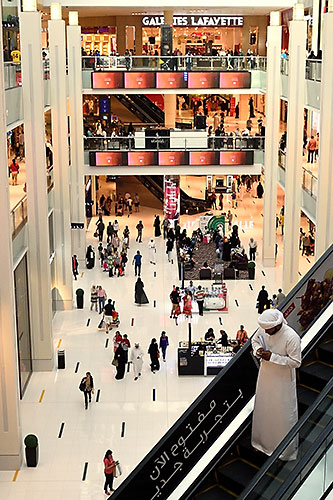
“New city,” said my amiable cab driver Abdul, while pointing to skyscrapers. He gestured to one: the skyline had held only that building when he arrived in Dubai in the early nineties.
(♦) If taking medications, read at least these two articles before booking your Dubai trip, unless eager to blog about Dubai’s jails.
(♦) My most valuable conversation in Dubai was one of my first, and I’m still ticked off that I was too tired to get much from it.
Red-eyed and dazed after sixteen hours aboard Emirates 226 from SFO, I lurched onto a metro at Terminal 3 and soon found myself chatting with two immigrants from India. (After boarding and disembarking a women-and-children-only car by mistake.) The Indians work at separate sites for a glitzy American hotel chain, one as a chef, the other as an electrician and handyman.
They told me:
- A huge chunk of Dubai’s population is made up of folk like them, building the buildings, preparing the foods, fixing what needs fixing and so on. Wikipedia puts the figure at 53%.
- Indian workers regularly delude themselves about prospects for a return home. “I’ll be back in a year.” “Well, maybe I can’t go back next year. Maybe in two years!” “Three years! In three years I’ll go back! That’s the limit!” Like that.
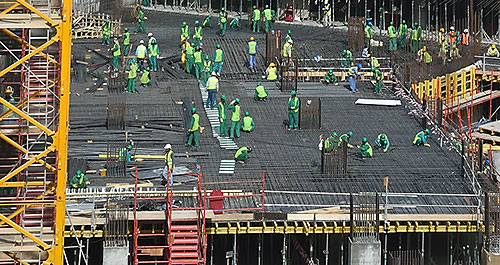
They sounded not-too-unpleasantly resigned to their lives as solitary breadwinners abroad. Days later, I met another cab driver who offered a much bleaker view of his Dubai life: no health benefits, no vacation, long hours, misery in the summer.
(In City of Gold, former AP reporter Jim Krane describes sewage smells in the Sonapur district, which houses many Dubai workers. Krane also writes of Dubai’s environmental profligacy, lawless roads and plenty more. Recommended, although written before the financial crisis.)
(♦) Jewish? Welcome to Dubai, homie! Your kinfolk are in the Koran! That’s Dubai’s red carpet you see, rolled out for you.
Israeli? Different story. Dubai supports the Arab League boycott, won’t admit Israelis without successfully pulled strings by someone with plenty wasta. Israel is even omitted from atlases used in some Middle Eastern schools.
(An Israeli stamp in your passport won’t keep you out, though.)
A Jewish dad and gentile mom doth not a Jew make, but I look plenty Jewish, and have occasionally dealt with trivial¹ incidents of anti-Semitism in years past. I experienced nothing of that kind in Dubai: not a wayward look, nothing.
¹True story, cross my heart: Up comes a homeless guy to my pal Arnold and me at an outdoor L.A. cafe, clutching a blanket around his shoulders. He points at me: “Hey! You’re Jewish, you’ve got money, you’ve got a BIG NOSE, how about” … and then proffered his hand for spare change, amidst Arnold’s merry laughter.

(♦) Dubai isn’t a democracy. It has grown rapidly because the late Sheikh Rashid won some big investment bets in decades past, and because his son and current Dubai leader Sheikh Mohammed wants his city to be a worldwide numero uno. It’s “Dubai, Inc.,” as far as Sheikh Mohammed is concerned; he sees himself as CEO.
In our Q&A session at the Sheikh Mohammed Centre for Cultural Understanding, Dahlia said that the leadership mantle isn’t automatically passed down to the next relative in the family tree. Rather, prospective heirs are each given a budget, and judged by how well they perform with it.
Dubai’s heir apparent is Sheikh Hamdan, aka ‘fazza3’ online. I am delighted (stunned, really) to see that the young sheikh has lent his imprimatur to a ‘car free’ day, but remain skeptical of the long-term prospects for a no-checks-and-balances autocracy. Nifty while they work, perhaps, but long ago Romans could tell plenty about what happens when they don’t.
(♦) That skepticism notwithstanding: stuff gets done here. Thirty years ago Dubai decided that it needed an airline, and launched it with $10 million in seed funding; today Emirates is profitable, and one of the largest airlines in the world. As for the metro: Dubai approved the contracts in 2005, and was carrying passengers by 2009. Bing, bang, boom. That fast.
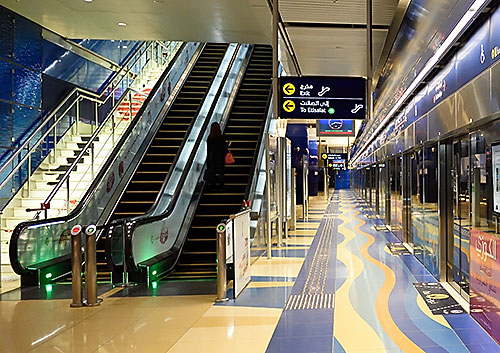
The metro practically gleams, from the entrance doors to the platforms. I found spotless station restrooms wherever I looked for them, and thought them the equal of anything you’d pay francs or kroner to use in Zuerich or Copenhagen. Riders get the exec-at-a-fancy-convention-center treatment, more so than in any other system I’ve used.
Most of the cars on an arriving train are economy class. At one end of the platform, however, you’ll also find:
- a car for women and children only, and next to it
- a ‘Gold Class’ car, for riders paying a price premium. Gold Class cars are more swankily appointed than economy class cars, but an econ-o ride is plenty nice.
The main argument for a Gold Class ticket is to escape the metro’s current Achilles heel: crowding. Economy class cars are often jammed, even with six minute headways. (Although this .pdf’d report holds that headways could be reduced to a mere ninety seconds.)
A transit lobbyist might leave Dubai with a wider smile than an auto lobbyist. It’s an oil-centric country, but the auto infrastructure isn’t appealing; driving in Dubai can be downright dangerous, and a cabbie told me that afternoon congestion can last from 3:00 to 8:00 p.m.. In contrast, the metro may be too popular for its own good, and could become a major tourist attraction in its own right, given the fantasyland views it offers of the futuristic Dubai skyline.
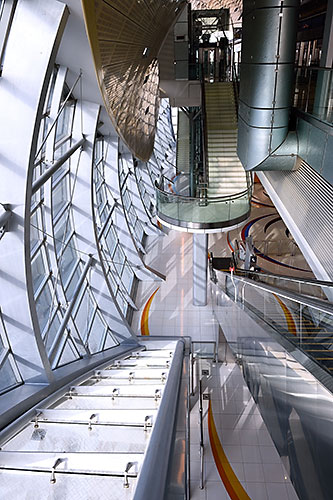
(♦) Off notes:
- Dubai struck me as more concerned with issues of social class than the U.S., perhaps because so many Indian guest workers serve a privileged Emirati minority. I much prefer the U.S. in this regard, even if it’s less egalitarian than it imagines itself to be.
- I winced while watching a woman lift a full face veil to sip a drink at the mall. I don’t understand her culture and faith, as I’m about to admit, but still wish the poor thing could enjoy a chai in public without having to hoist a piece of cloth. Me thinks that would get old plenty fast.
(♦) I’m old enough to be more impressed by the vastness of my own ignorance than by the little I think I understand of life. On my second morning in Dubai, I had an epiphany that showed me that this ignorance is even larger than I’d guessed.
I’d misunderstood the signs for the Dubai Creek water taxis, and wound up farther east on the northern shore than I’d intended. Muttering a few unteacherly curses under my breath, I fired up RMaps on my smartphone and began wandering west. Soon I found myself in a maze of narrow commercial side streets, amidst trading company storefronts with bilingual English and Arabic-lettered marquees, among men in ankle-length robes and embroidered skullcaps, as well as western wear.
‘So this is Deira,’ I thought, and had my epiphany while regarding the fellows in the Middle Eastern wear, and realizing how little I knew of their culture.

I am a product of the California suburbs, and have reached a ripe (overripe, some would say) age with virtually no contact with the Muslim world. I’d never seen anyone wearing a thobe or a kufi while pedaling my childhood paper route, or waiting at the market to squander allowance quarters on Big Hunks and Batmans. I didn’t think I was unsympathetic in my ignorance. “I’ll bet TSA must put that poor guy through the meat grinder,” I’d thought a number of times, when I spotted men in Arab dress at American airports. But it was still too easy to regard anyone wearing such clothes as two dimensional, other-worldly, a subject for stereotypes.
Well, here I was among hundreds, no, thousands and thousands of these supposed candidates for the TSA meat grinder, and the nearest TSA agent was half a world away. Around and past me they strolled in their caps and robes, with no more than a glance for the tourist shuffling along with his camera. I knew nothing about them. Roughly one in five of my fellow earthlings is Muslim, and I knew diddley squat about the Koran, their heritage, their culture.
That humbling moment stuck, went down on tape, lingers with me now.
(♦) For more and bigger photos, please see my Flickr albums. Lucky ol’ Tim got to visit Athens, Rome and Barcelona while abroad this time, too, as you’ll see.